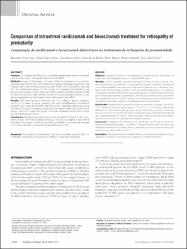Comparison of intravitreal ranibizumab and bevacizumab treatment for retinopathy of prematurity

Göster/
Erişim
info:eu-repo/semantics/openAccessTarih
2015Yazar
Erol, Muhammet KazımÇoban, Deniz Turgut
Sarı, Esin Söğütlü
Bilgin, Ahmet Burak
Doğan, Berna
Özdemir, Özdemir
Tunay, Zuhal Özen
Üst veri
Tüm öğe kaydını gösterÖzet
Purpose: To compare the efficacy of intravitreal ranibizumab and bevacizumab treatment for type 1 retinopathy of prematurity (ROP).
Methods: 36 eyes of 20 patients with type 1 ROP who received anti-vascular endothelial growth factor (anti-VEGF) intravitreal injections between August 2011 and February 2013 were retrospectively evaluated. Fifteen eyes of 8 patients received 0.25 mg ranibizumab (group 1), and 21 eyes of 12 patients received 0.625 mg bevacizumab (group 2). Eyes were examined by indirect ophthalmoscopy on the first day, third day, first week, and first month and as required after injections. Laser photocoagulation was performed in cases with progression of ROP.
Results: The mean gestation time was 26.2 +/- 2.7 weeks in group 1 patients and 27.1 +/- 2.5 weeks in group 2 patients. No statistical difference in the time of gestation was observed between the two groups. The mean follow-up period was 20 +/- 4.5 months. Laser photocoagulation was performed in 6 of 15 eyes from group 1 and 2 of 21 eyes from group 2. No eyes developed retinal detachment during the follow-up period.
Conclusion: Ranibizumab and bevacizumab showed an efficacy in the treatment of type 1 ROP. The incidence of disease relapse was higher in eyes which received ranibizumab. Further randomized, controlled clinical trials are required to compare the efficacy of ranibizumab and bevacizumab.

















